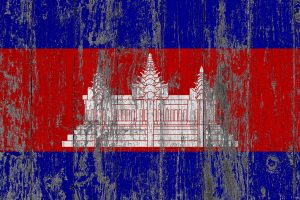Cambodian police have rescued 16 Malaysians held captive in Sihanoukville on the south coast, where they were forced to work in online scam operations after being fooled by human traffickers offering big pay and false jobs.
Their rescue was launched as the Malaysian ambassador to Cambodia wrote a letter to Gen. Neth Savoeun, the chief of the country’s National Police, asking for help in securing the release of about 50 Malaysians who were allegedly being held against their will.
They are in an appalling situation after being duped and trafficked into working online scams and had relayed their plight to Malaysian politicians and civil rights groups via smartphones from what have been described as “slave compounds” controlled by armed guards.
The whereabouts of the others are not known.
Their plight has also been well covered by the international media. Press conferences in Kuala Lumpur where heart broken parents plead for the release of their children should have been enough to prompt Cambodian authorities into action. Some are as young as 17.
The first press conference was held on April 1, a second on April 7. In mid-March, a group of 35 NGOs urged the Cambodian government to address “a crisis of forced labor, slavery and torture” amid persistent reports of kidnapping and extortion rackets on this country’s south coast.
“We work more than 15 hours a day. They give us instructions to scam people around the world,” one victim told Thursday’s press conference. “If we do not perform, they hit us. More than 30 of us have been mistreated because we underperformed.”
And that followed warnings from another five Asian embassies about “the situation” in Cambodia, including those of China and Pakistan, which were issued as the local press, in particular the Khmer Times, published story after story detailing how people had been tricked by scam artists.
Indonesia, Vietnam, and Thailand, also issued warnings, making up with Malaysia almost half of the Association of South East Asian Nations (ASEAN), an almost unprecedented move given the bloc’s long history of preferring not to comment about each other’s internal affairs.
Yet another report was released by the Cambodian government – when parents and politicians were holding their second press conference – confirming that the number of human trafficking cases had roughly doubled in 2021 from a year earlier.
The dramatic increase occurred despite the severe travel restrictions imposed to curb the spread of COVID-19 – but the pandemic was also a cause because the harsh economic realities it imposed had forced people into taking greater chances when promised greater pay for working abroad.
“Criminals are choosing human trafficking as a career,” Interior Minister Sar Kheng said. “They won’t let it go. They are taking advantage of us when we are facing a crisis.”
That report by the National Committee for Counter Trafficking also found that surrogate mothers, babies, organ transplants, laborers, and sex workers were among those trafficked and that Cambodia had emerged as a trafficking destination as opposed to its history as a transit point.
“The suspects lured the victims to work in Cambodia due to the country’s development and political stability,” Committee vice-chairperson Chou Bun Eng said. “There was a huge increase compared to 2020. We found 359 cases in 2021 whereas in 2020 there were only 155 cases.”
With such a wealth of information – and presumably a rough idea of where the Malaysians were being held – one can only wonder why Eldeen Husaini Hashim, the Malaysian ambassador, even had to ask for help.
But in Cambodia old habits do die hard.
Last year the U.S. Department put Cambodia on its Tier Two Watchlist for a third year in a row, which essentially means the country does not fully meet the minimum standards for the elimination of trafficking but is making significant efforts to do so.
“Endemic corruption and lack of political will continued to severely limit progress in holding traffickers accountable; corruption continued to impede law enforcement operations, criminal proceedings and victim service provision,” it said.

































